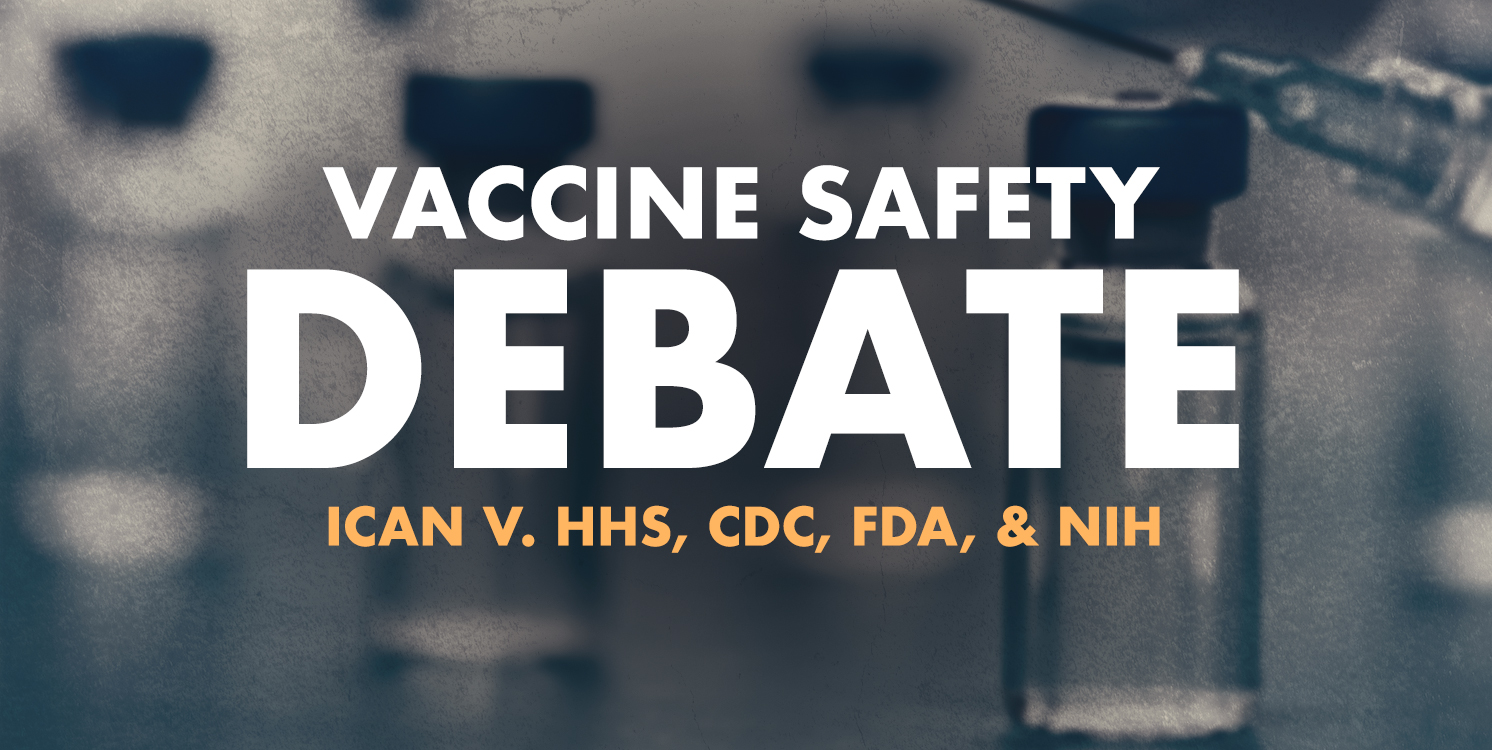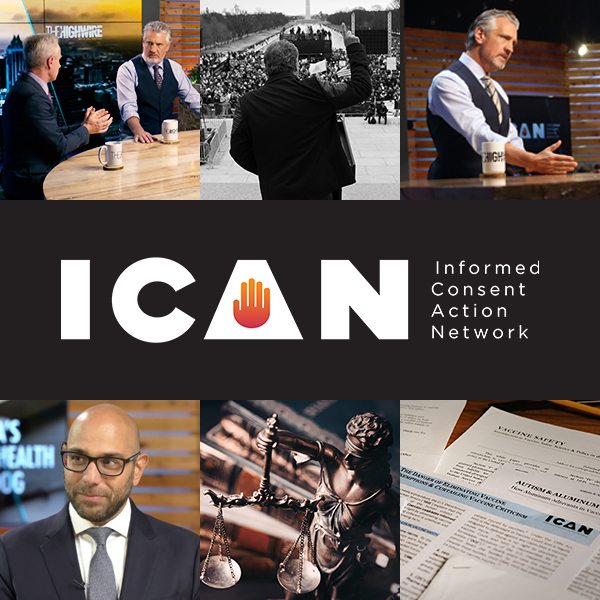Share this:

ICAN vs HHS
On the morning of Tuesday, May 30th, 2017, Robert Kennedy Jr. lead a small delegation of lawyers, scientists, journalists and parents of vaccine injured children onto the campus of the National Institute of Health (NIH), an agency within the United States Department of Health and Human Services (HHS), for a meeting regarding the “Safety Of Vaccines.” The meeting was arranged by the newly elected President, Donald Trump, who had expressed concerns about vaccine safety throughout his campaign. Sitting across the long conference room table from the Kennedy delegation were scientists that are considered the world’s leading specialists on child health, mental health and vaccines from across the NIH, including:
• Francis Collins – Director of the NIH,
• Anthony Fauci – Director of the National Institute of Allergy and Infectious Disease
• Joshua Gordon – Director of the National Institute of Mental Health,
•Diana Bianchi – Director of the Eunice Kennedy Shriver Institute of Child Health
& Human Development,
• Mary – Sumpter Lapinski – Counselor to the Secretary of Health and Human Services (HHS),
• Linda Birnbaum – Director NIEHS,
• Lawrence Tabak – Principal Deputy Director of NIH, and
• Carrie Wolinetz – NIH Director Chief of Staff.
At the head of the table sat Reed Cordish, President Trump’s appointed Assistant on Intergovernmental and Technology Initiatives who was tasked with moderating the discussion.
During the two-hour meeting, Kennedy, one of the world’s leading authorities on environmental law, laid out a detailed case regarding many of the most glaring concerns with the childhood vaccine program. Kennedy’s presentation laid bare:
- The lack of standard safety studies in the pre-licensing phase of vaccine development, including that there isn’t a single childhood vaccine given to babies and children that was licensed based on a placebo-controlled clinical trial.
- The ineffective post licensure vaccine injury surveillance system that apparently fails to capture millions of vaccine injuries in the U.S. every year.
- The conflicts of interest inside the government’s regulatory agencies which are tasked with conducting safety studies to protect the public from vaccine dangers while simultaneously defending vaccines in cart against people who have been injured by them.
- The disingenuous public mantra by HHS and its health agencies that “Vaccines Are Safe And Effective” despite the more than fifty thousand vaccine injuries and hundreds of deaths reported each year that have resulted in over four billion dollars in legal settlements to date.
Though Kennedy was addressing the brain trust of vaccine science, one wouldn’t have guessed it from their confused and often conflicting responses. For instance, when Kennedy claimed that none of the 16 childhood vaccines injected into children had over been through a “gold standard” double blind placebo study to establish safety prior to licensure, one of the scientists objected declaring, “There most certainly are placebo studies! They are conducted in the early stages of vaccine development.” When asked to provide proof of those studies another scientist eventually chimed in and proclaimed “Placebo studies are never conducted for vaccines because it is considered unethical.” In the end it was clear that the greatest minds of vaccine science were unprepared to answer the basic questions about vaccine safety the Kennedy delegation asked, even though most of the points and questions raised had been culled from HHS’s own literature, studies, and websites.
The meeting was adjourned with moans and grunts of disdain from the body of HHS’s leading scientists and agency heads who requested time to assemble answers to basic questions regarding vaccine safety. Over the next two months an email exchange between Kennedy and the body of scientists, headed by Francis Collins, revealed that these scientists were utterly incapable of supporting the safety of childhood vaccines or the childhood vaccine schedule HHS aggressively pushes upon every child in this country. Trump’s adviser, Reed Cordish, who had continued to referee the discussion between the two sides online, refused to press the scientists for answers to simple questions they were clearly evading. With that, the promise of a thorough discussion on vaccine safety came to a grinding halt and died behind the closed doors of the NIH. From its ashes was born the idea of the HHS Notice.
Kennedy has consistently described himself as pro-vaccine and pro-child health. In speaking with the NIH scientist he was representing all Americans, irrespective of their views on vaccines, by seeking answers to reasonable safety concerns surrounding the dozens of vaccine products that are injected into virtually every child in America. It was difficult to understand whose interests these scientists were representing when they refused to answer Kennedy’s questions regarding vaccine safety. More troubling still was the realization that, because the NIH meeting and follow-up emails occurred behind “closed doors,” no one in the world would know that the world’s top vaccine scientists had just forfeited the Great Vaccine Debate. It was therefore time to repeat this debate in public.
The original HHS Notice compiled all of the questions that had been raised at the NIH along with additional concerns that had transpired from the meeting and email responses. It was delivered by the Informed Consent Action Network (ICAN) to Eric D Hargan, the Secretary of Health and Human Services, on October 12, 2017. Unlike the NIH meeting, which had been conducted in secrecy, the HHS Notice was announced to the public and had signatures representing over 5 million people through more than 50 organizations. This time the world would learn the truth about the questions and issues surrounding the safety of childhood vaccines and the childhood vaccine schedule.
In January of 2018, ICAN received the HHS Response letter. It was a collaboration by multiple agencies within HHS, including CDC, FDA, NIH, and HRSA which made numerous unsupported conclusory assertions, misstatements, and referenced, directly and indirectly, numerous studies aimed at addressing some of the concerns put forth in the HHS Notice. ICAN spent nearly a year doing its due diligence, researching every assertion made by HHS and reading every one of the studies HHS cited to write the detailed ICAN Reply to HHS. In its reply, ICAN described HHS’s failure to support many of its most basic claims regarding vaccine safety as well as point out the plainly false and dangerous claims perpetuated by the childhood vaccine program and exemplified by the HHS Response.
This book contains all three of the documents listed above: The HHS Notice, The HHS Response and the ICAN Reply to HHS. The reader who is interested in getting to the heart of the issue quickly can skip ahead to the third chapter and read the final document in the series, the ICAN Reply to HHS. It is self-explanatory and contains excerpts from the original documents to clearly understand the context behind each discussion.
For the more discerning reader, all of the documents and citations have been supplied in this book so that you can see the clear support for every assertion made, which you will note almost all came from HHS’s own documents.
This is not fiction. This is not a textbook. This is the official debate on one of the most important subjects in the world – – the safety of our children.
Get a cup of tea or coffee, and get ready to finally read the great vaccine debate so you can make a truly informed decision the next time you need to decide whether to vaccinate yourself or your child.
